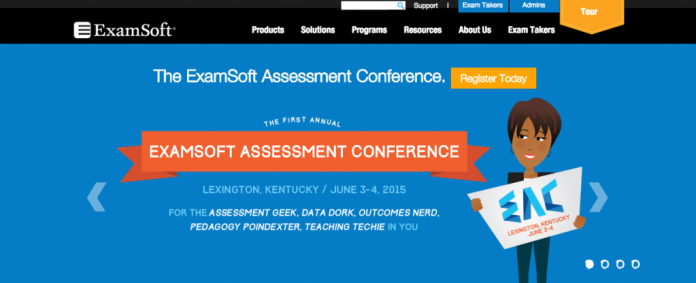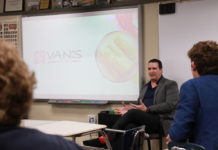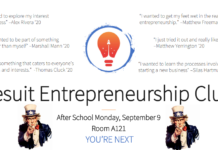“Growing up, my dad always told me—he was a entrepreneur—don’t go into business, just be a professional.”
Apparently you shouldn’t always listen to your parents. In a group discussion with the Jesuit Entrepreneurship Club, Mr. David Schnabel opened up to students about his path to success from a student who didn’t know what he wanted to do, to an employee at Goldman Sachs, to the CEO of Gold’s Gym, and finally, to the CEO of ExamSoft.
Mr. Schnabel began his story as a confused student: “By my senior year, I was trying to figure out what I wanted to do with my life. So, I applied to law school, which back when I was in school was what you did when you didn’t know what you wanted to do because it prepared you for everything…I had a couple of friends there who told me, ‘Why don’t you go get some work experience before you actually enroll? If you decide you do want to enroll, it’ll be great background for you since you’ll actually know what you want to study in law school, and if you decide you really like that work experience then you never have to go.’ So that’s exactly what I did.”
After applying for jobs in investment banking and management consulting, Schnabel gained some valuable interview experience at Morgan Stanley: “I was really excited for this interview, it’s where I thought I wanted to work, but I didn’t really know why. I guess I saw the name on TV and thought it sounded good. I didn’t get the job, so afterwards they called me up and asked if I wanted any feedback. They told me, ‘The real problem was, you seem like you have great credentials, but we didn’t feel like we got to know you as a person, you were really stiff.'” Schnabel advised club members that showing your personality and who you are is definitely important in the interview process.
Schnabel went on to describe a more tense, although more successful interview:
“So my next interview was with Goldman Sachs. I walk in, and the woman who was the interviewer says, ‘You’re late.’
I was thinking, ‘No hello? No cordial greeting?’
But the woman said, ‘You’re late, why are you late?’
‘Well actually, I didn’t think I was late, you know it’s 1:31, the interview was supposed to be at 1:30’
‘No, no, you’re a half hour late.’
‘I mean I had it in my calendar, and this is the time I was told.’
‘So are you telling me I don’t know what I’m talking about? You’re telling me that we have it wrong? I think you must have it wrong.’
‘Ok, well I’m sorry if there was any confusion.’
So she said, ‘Alright, looking at your resume, it seems like you have good grades, do you think you’re smarter than everybody else or are you a grind? Do you just work harder?’
I tried to give the appropriate answer of, ‘Well, you know, doing well is a combination of working hard and having natural talent…’
And she interjected, ‘No no no no, don’t give me a BS answer, it’s A or B.’
And she kept questioning me, and eventually I just sort of snapped. ‘Listen, I’m really interested in the job, but it just seems like you’re being really confrontational and combative and I’m not really sure where it’s coming from.’
At that point, she just sat back and went, ‘Okay, I just wanted to know if you had any backbone. Now that I see you’ve got a little something to you, now let’s talk.’
So that really told me what investment banking would be like. It was a great experience, but really tough. Probably the toughest work experience that I’ve ever had. It was awesome, and I loved it. So that experience and that interview told me, you kind of have to be true to who you are and you have to stand up for yourself.”
Schnabel worked as an investment banker at Goldman Sachs, and, in order to describe the profession, he said, “Have you guys seen the movie Wall Street? It’s not really like that except for the suits and, for some people, the attitude.” After working at Goldman Sachs for a few years, Schnabel discovered that law was more of a placeholder for him, and that he really wanted to go into business. He then decided to take the other route he was considering out of college, and ventured into management consulting, working for McKinsey & Company, a strategy and consulting firm.
He also spoke on what a consultant actually does, calling the experience “more academic” than investment banking, as it involves a lot of “big picture problem solving.” As an example, he mentioned that “One of my first projects was working for Johnson and J0hnson, a big healthcare provider that you all probably know as a consumer goods company. They wanted to know what else they could do to serve the diabetes population. So we looked at buying other diabetic device manufacturers, or building our own product. So it’s problems like that you’re working with as a strategy consultant.”
Eventually, Schnabel wanted something more, so during the dot com bubble, he downsized: “I found a start-up with a lot of financial backing, and joined them. So I went from a really big, formal company to a start-up. It was a blast. There was food catered every day, masseuses coming in every week, games in the office, and we never made a dollar. It was fun, but kind of a mess…I kind of saw the writing on the wall, and I ended up moving to a family office here in Dallas, which is how I got here in Texas. I combined a lot of my previous experience, so I was buying companies, making investments, and eventually got involved running and operating some of what we bought.”
This point in Schnabel’s career was when he became involved with Gold’s Gym: “One thing we bought was Gold’s Gym. Gold’s Gym was a lot of fun…One of the things we wanted to do was buy up a lot of individual locations, since a lot of them were owned by individual franchisees, mom and pops in different parts of the country.” He regaled the story of one of the first franchisees he negotiated with. After spending the whole day in talks, Schnabel and the owner were going to have dinner and a preliminary celebration. The owner’s wife, dressed head to toe in pink, “looked me up and down and just went ‘Well, you’re just a nerd!'”
The next transition in Schnabel’s life came in 2009, when the economy was in a major slump, which is also “the best time to buy something.” After working with some investors, Schnabel decided to purchase ExamSoft, an educational technology company. The company facilitates test-taking with technology, allowing teachers to grade tests and essay responses on computers instead of in handwritten format. Schnabel found that the company “was in a really interesting market position, with a lot of loyal clients, but it wasn’t really growing.” Schnabel thought about the concept, and felt that technology would become a great deal more common in educational applications.
“Around the time we bought the company we had 100 and something clients, so schools or universities. Today we have about 800. Back then we had around 12 employees, and now we’ve got about 90. All of this was essentially because we saw opportunity…So we had this technology wave behind us, why don’t we make this platform about all sorts of tests and quizzes, but let’s make it really helpful. Let’s give students feedback on their strengths and weaknesses….Why don’t we gather all of this data and information that teachers and administrators uses automatically instead of having them do it by hand? So we’ve been continuing to grow really fast.”
Schnabel felt that his experience with the company has been one of his greatest learning experiences yet, saying, “I think the big takeaway for all of this, is that for me, my whole story was a manner of building skill sets, trying to figure out what interested me, what I was good at, what I wasn’t good at. Then, when I saw an opportunity, I could bring the skill sets I had together, and I tried to understand what skills I don’t have and realize that I need help for that. That’s what I think has made the company successful so far.”
When asked about his Harvard and Stanford education and the role those connections have played in his business life, Schnabel responded, “It helps. I increasingly believe that what’s most important, is not the stamps or where you go. It’s developing an expertise in something. I think the world’s changing a lot, and the most important thing is to really learn something well, so you can be a pro at it and always bring that skill set to what you do. Yeah, at the same time, networks are important, and yes those connections are helpful. A business partner of mine went to Harvard Business School, one of our key backers went to Harvard, and another one went to Stanford. But could we have done it without that? Yeah, it’d just have been harder.”
He also advised students on what paths they consider taking in business: “The entrepreneurial path is trickier, and if you want to do that, my advice would be to ask yourselves deep down, what’s most important to you. Is it really being independent, and being your own boss, and carving your own path? Or, do you take some comfort in having something established and secure for you? But if you decide that your truly do want to carve your own path, then the next question to think really hard about is, what makes you special? What are you going to be successful with? The idea to do something is fine, but you have to really figure out what makes you special enough to make that idea happen. And if you don’t have it, do you have a network to try and pull that together? If you don’t have either of those things, my advice is to wait until you do, and if you don’t, then hustle to try and pull it all together.”






